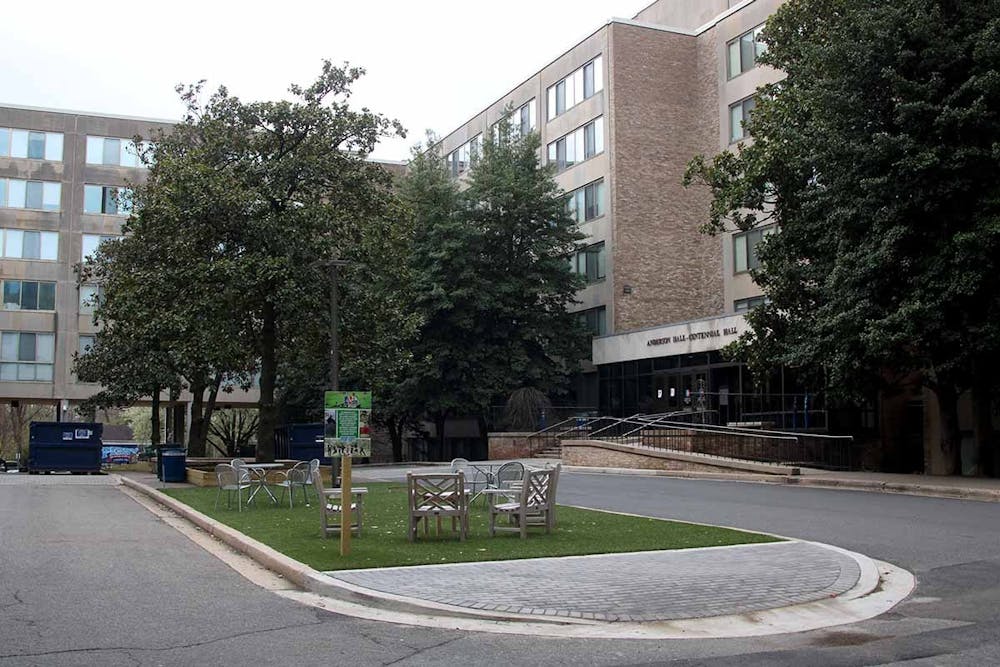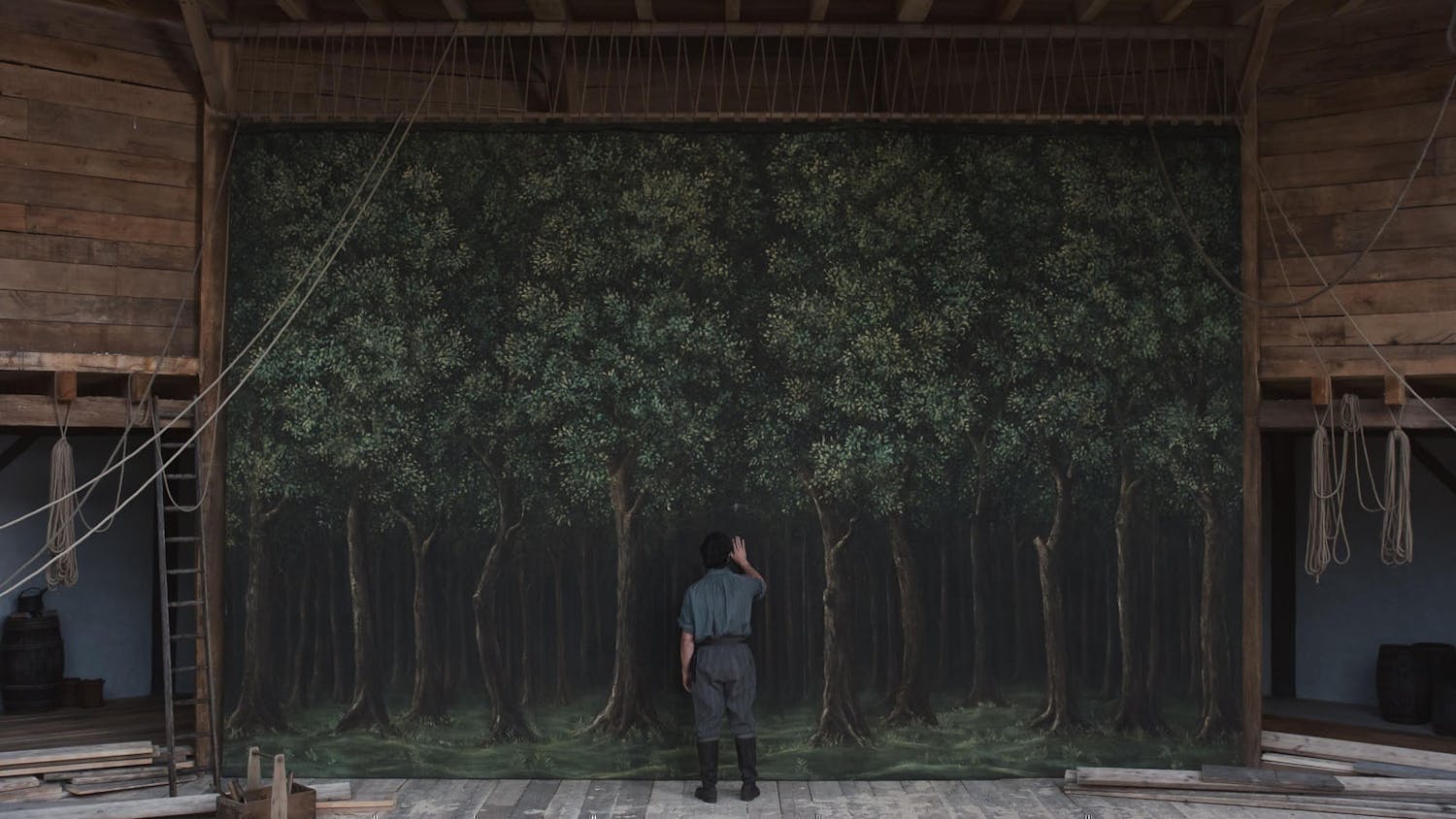After the coronavirus pandemic stole Francisco Ferrisi’s senior year of high school and first semester of college, he jumped at the opportunity to move to D.C. when American University announced the Mid-Semester Residential Experience during the spring semester.
A month into the program, which began in early March, Ferrisi has already noticed the benefits of widening his social circle and living on campus.
“This is like the most human interaction we’ve had in about a year,” Ferrisi said. “I’ve had to introduce myself to like 50 people in the last day, and it’s different from what the traditional college experience would be like. However, it’s something and I think a lot of us appreciate that.”
One month ago, 527 students moved into single-person rooms in Anderson, Letts and Hughes halls, their home until the Mid-Semester Residential Experience wraps up on May 5. Some are using the opportunity to attend in-person classes, but, for many, the main draw of the MSRE is the opportunity to live on campus and meet fellow students in person.
Students paid $2,478 for a room and $1,588 for a 100-block meal plan, bringing the cost of the 62-day campus experience to $4,066. According to the MSRE website, financial aid awards could be applied to the costs of living. Ferrisi said convincing his parents to pay for the experience didn’t take much, given they saved money during his virtual fall semester.
Jehane Djedjro, a freshman in the School of International Service, said her parents were also on board with sending her to D.C., opting for on-campus housing rather than an apartment. She flew in from Los Angeles with her family in early March, excited to experience campus living and meet friends she’d already made through social media.
“I have like a little friend group of like two people and basically every night we just go to every single floor on Anderson and Letts and knock on people’s doors, introduce ourselves and basically form connections like that,” Djedjro said. “Because everyone is sort of on the same playing field, everyone’s open to connecting.”
In addition to the social benefits of the MSRE, Djedjro said she especially enjoys being in the same time zone as her professors and many of her peers. During her first semester of college, Djedjro said she was put at a disadvantage, having to wake up as early as 5 a.m. to attend morning classes.
While Ferrisi and Djedjro are meeting people in their own dorms, others are taking advantage of virtual and outdoor socially distanced events organized by the Residence Hall Association. On March 22, the RHA hosted two screenings of episodes from “The Falcon and The Winter Soldier” in the amphitheater. Dominic Brunaccioni, a sophomore who organized the outdoor event, said it drew 45 people between the two screenings.
Alana Cunningham, the social media coordinator for the RHA, attended the event and said that while students seemed to enjoy it and were respectful of social distancing guidelines, the possibilities of in-person events are still limited.
“I know D.C., as a whole, has increased their outside capacity to 50, but the University has kept theirs at 25,” Cunningham said. “So I think with that limit still being in place and all the regulations being followed, it’s definitely hard to produce and put on any of the events that we used to do last year.”
The University currently houses 767 emergency housing and MSRE students, according to a University spokesperson, the most to occupy campus since administrators shut it down last March due to the rapid spread of the coronavirus across the U.S.
With an increase in tenants, Fanta Aw, the vice president of campus life and inclusive excellence, said she expects to see a rise in reported on-campus COVID-19 cases.
On March 15, The Eagle reported that AU’s first confirmed cluster of coronavirus cases had emerged in Nebraska Hall, where students have been living in emergency housing since the beginning of the semester.
Students told The Eagle that the University has not enforced many of the COVID-19 health protocols MSRE participants are told to follow.
“They haven’t been enforcing the quarantine guidelines as much as they said they would, which I’m personally okay with because we’re all being tested,” Ferrisi said. “They did kind of like overstate how much they would be enforcing.”
While Ferrisi said his general impression was that students follow social distancing and mask-wearing guidelines while in public areas, he added that he’s seen rooms with up to eight unmasked people.
Djedjro said she’s seen other students enforcing room limits, at times knocking on doors with more than two people, the University’s stated limit, and asking students to disperse.
“Sometimes the RAs don’t really care, so we tend to get a few more people than the maximum capacity, but everyone always wears masks,” Djedjro said. “We know that, like, if anything, we’re staying as safe as we can.”
Both Ferrisi and Djedjro said that they haven’t seen their resident assistants regularly out monitoring their floor or enforcing COVID-19 protocols.
Tyler Moore, a resident assistant on the second floor of Anderson Hall, said her students are so spread out that monitoring all of them is impossible.
“I have 25 residents and I’d say about 20 of them are on Anderson North like very, very far away, and then I have five residents that are on this side,” Moore said. “So obviously trying to be present, but also keeping compliant with social distancing guidelines and things like that have been difficult.”
Moore said that so far, she wasn’t aware of any student noncompliance on her floor. If there ever is, she said that the University instructed RAs to ask students to disperse and then call a community director if they don’t comply. She thinks that the University has handled the MSRE well.
“I really do think that the University is trying to do the best for the circumstances in terms of trying to keep numbers down,” Moore said. “From what I’ve seen, the residents are still able to hang out with each other and still make those relationships … that everyone is yearning for.”
Aw recently told The Eagle that she wouldn’t dispute the claim that the University’s coronavirus rules are lax. She said that rather than policing its residents’ activities, the University wanted to build a shared responsibility for health and safety in the on-campus community.
She has now clarified that the University does enforce direct, blatant violations of the coronavirus guidelines.
“If folks are not following those guidelines and we have reports of that … we work with people on making sure that folks are trying to follow those guidelines as much as possible,” Aw said. “And if we find that there’s a lack of compliance and what I call intentional lack of compliance, then it could lead to someone being removed from housing.”
Aw wouldn’t specify how many students have been removed from housing but said none of the removals occurred in the past three weeks. Aw said that removal is rarely the first step and that most students receive a warning, probation or both before losing their housing.
With only three weeks of the spring semester left, Aw said the University continues to evaluate its coronavirus procedures as it ramps up to fully re-open in the fall.
“We’ve based them on what we’ve learned from other places. We based them on what we know about the science,” Aw said. “We based them on the guidance from CDC and the Department of Health. And in some cases, we have intentionally been much more prudent in our decisions because we want to make sure the health and safety is the number one priority.”





